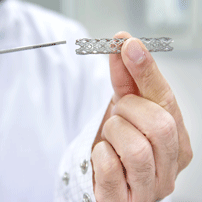Study Finds Procedure to Relieve Chest Pain is Ineffective
November 30, 2017 Heart disease continues to be a leading cause of death in the U.S., claiming the lives of approximately 790,000 people each year from heart attacks alone. One of the most common treatment options is stenting, which involves inserting a tiny wire cage that opens-up blocked arteries. Doctors also use stents for the thousands of heart disease patients who suffer from chest pain. However, a new study suggests that stenting is ineffective at relieving chest pain, surprising many cardiologists who use this procedure on thousands of heart patients each year.
Heart disease continues to be a leading cause of death in the U.S., claiming the lives of approximately 790,000 people each year from heart attacks alone. One of the most common treatment options is stenting, which involves inserting a tiny wire cage that opens-up blocked arteries. Doctors also use stents for the thousands of heart disease patients who suffer from chest pain. However, a new study suggests that stenting is ineffective at relieving chest pain, surprising many cardiologists who use this procedure on thousands of heart patients each year.
Researchers found that stents are effective at opening-up blocked arteries, so when someone is having a heart attack, inserting a stent can be a life-saving procedure. However, stents are more commonly used in patients who experience chest pain related to a blocked artery. Simple tasks like walking up a hill or a flight of stairs can cause pain when there is blockage in an artery. Many leading cardiologists were stunned by the study’s results and raised questions as to whether stent procedures should continue to be used to treat chest pain.
Study Highlights
Dr. Justin E. Davies, a cardiologist at the Imperial College in London, and his colleagues recruited 200 patients to participate in the study. Each patient had a profoundly blocked coronary artery which caused severe chest pain that limited their physical activity. All participants were initially treated with drug therapy, including aspirin, statins, blood pressure medicine, and medication to relieve chest pain.
Doctors then performed a procedure on each of the patients, involving a catheter being threaded through the groin or wrist up to the blocked artery. In some patients a stent was inserted to open-up the blockage. In others, who were considered the control group, the catheter was pulled out without inserting the stent. After the procedure, both groups were given strong anticoagulant medication. None of the patients or researchers were told who was going to receive the stent.
Surprisingly, researchers found that the patients in the control group experienced similar improvements as the group that received the stent. Both groups experienced less chest pain, and performed better on treadmill tests. One reason for this, cardiologists point out, is that patients were experiencing a placebo effect from the procedure. However, Dr. David L. Brown of Washington University School of Medicine and Dr. Rita F. Redberg of the University of California, San Francisco, suggest that the cardiology guidelines should be revised since the current guidelines are based on studies in which patients said they felt better after the stent procedure was done.
In the United States, stenting is a widely accepted method of treating chest pain. Some patients would rather have a stent inserted than take medication. Dr. Neal Dickert, Jr., a cardiologist and ethicist at Emory University, hopes that the study encourages other cardiologists to consider doing more studies that involve placebo procedures.
Baltimore Medical Malpractice Lawyers at LeViness, Tolzman & Hamilton Represent Victims Injured During Medical Procedure
If you have been injured during a stent procedure, contact a Baltimore medical malpractice lawyer at LeViness, Tolzman & Hamilton. We will determine who is responsible for your injury and seek the maximum financial compensation you deserve. To schedule a free consultation, call us today at 800-547-4LAW (4529) or contact us online.
Our offices are located in Baltimore, Columbia, Glen Burnie, and Towson, allowing us to represent medical malpractice victims in Maryland, including those in Anne Arundel County, Carroll County, Harford County, Howard County, Montgomery County, Maryland’s Western Counties, Southern Maryland, and the Eastern Shore, as well as the communities of Catonsville, Essex, Halethorpe, Middle River, Rosedale, Gwynn Oak, Brooklandville, Dundalk, Pikesville, Nottingham, Windsor Mill, Lutherville, Timonium, Sparrows Point, Ridgewood, and Elkridge.






